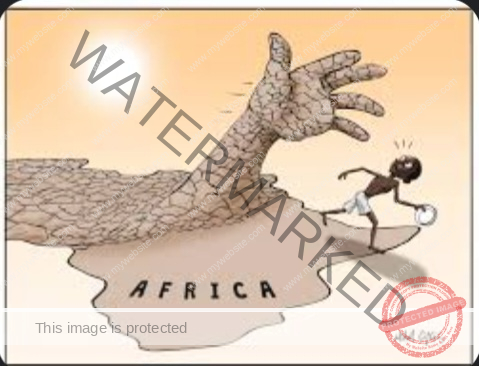Françafrique survives by disguising domination as fraternity. But in Ambazonia, the disguise has never worked. Here, the neglect is so total, the exploitation so naked, that even the illusion of partnership is impossible.
By The Independentist Editorial Desk
France has long presented itself as Africa’s reluctant partner, weighed down by history but eager to move forward. Emmanuel Macron, the first French president born after colonial rule, once branded colonialism a “crime against humanity.” In Ouagadougou, he told students that his generation would not dictate Africa’s future. Supporters of the CFA franc argue it has at least delivered stability: low inflation, predictable currency, and, in moments of crisis, a French guarantee.
This is the narrative Paris sells to the world — and some African leaders repeat. Alassane Ouattara, Côte d’Ivoire’s president, insists that reforming the CFA gradually is safer than a rupture. For elites in Dakar and Abidjan, the CFA franc and French backing offer a shield against shocks.
But Ambazonia tells a different story. Here, the promises of Françafrique ring hollow. There are no roads, no schools, no industries built for the people. Only soldiers. Ambazonia inherited the costs of Françafrique — exploitation, neglect, and repression — without ever tasting its supposed “benefits.”
The Architecture of Françafrique
Unlike in Indochina or Algeria, where wars forced French withdrawal, independence in West and Central Africa was cosmetic. De Gaulle preserved control not through governors but through systems.
Economic chains: The CFA franc locked reserves in the French Treasury, siphoning capital to Europe and curtailing African credit.
Political puppetry: France nurtured loyalists like Ahmadou Ahidjo and Paul Biya, whose allegiance was to Paris before their people.
Military muscle: French troops and covert advisers intervened to stabilize regimes that served French interests.
For many CFA states, this arrangement brought meager returns: stable inflation, a semblance of macroeconomic order, and showcase projects in capitals like Abidjan and Dakar. For Ambazonia, there was nothing.
Ambazonia: Exploited Without Return
Southern Cameroons — Ambazonia — was annexed into La République du Cameroun in 1961 with France’s approval. But unlike other former colonies, it was never cultivated as a showcase. Instead, it was treated as a frontier to be stripped bare.
Oil without development: SONARA refinery in Victoria processed Ambazonian crude. Revenues flowed to Yaoundé and Paris, while locals endured pollution, unemployment, and underdevelopment.
Plantations without progress: The CDC’s vast banana, palm, and rubber estates enriched the state but left workers in poverty and towns without modern infrastructure.
Timber without transformation: Forests in Manyu and Ndian were felled for export, with no reinvestment in industry or roads.
Gendarmes without governance: Instead of schools and hospitals, Ambazonians received checkpoints, harassment, and later, massacres.
In short, Ambazonia got all the exploitation, none of the dividends.
The CFA Franc: A Currency That Never Served Ambazonians
Defenders of the CFA argue it provided predictability. Inflation was lower than in neighboring states; industries like cocoa and cotton expanded after the 1994 devaluation. For elites in West Africa, these were not negligible gains.
But Ambazonia never saw them. Credit was scarce, prices high, and opportunities absent. The pegged system funneled capital away from Buea and Bamenda, north to Yaoundé, and onward to Paris. Ambazonians were never at the table. Their economy was decided in Paris and Yaoundé, never in Victoria or Kumba.
For Ambazonia, the CFA franc is not stability. It is irrelevance layered on top of exploitation.
Dr. Sako’s Position: Liberation Beyond Yaoundé
President Dr. Samuel Ikome Sako has consistently argued that Ambazonia’s struggle is not merely about escaping Paul Biya’s dictatorship. It is about dismantling the entire framework of Françafrique that sustains Yaoundé.
He has said that true independence must mean breaking free from both annexation and neocolonial dependence. This includes rejecting the CFA franc system, ensuring Ambazonian resources are controlled by Ambazonians, and preventing foreign powers from dictating economic or security policy.
In Dr. Sako’s vision, Ambazonia will not trade one master for another. Independence will mean sovereignty in the fullest sense: currency, economy, and governance designed by Ambazonians for Ambazonians.
A Balanced Verdict
To be fair, Françafrique was not without benefits elsewhere. It gave some states stable currencies, manageable inflation, and symbolic infrastructure. France points to these as proof of its “partnership.”
But Ambazonia’s experience isolates the lie. It received no showcase highways like Côte d’Ivoire, no French-built universities like Senegal, no “stable development” narrative. Only plantations, oil rigs, timber concessions — and the soldiers to guard them.
Conclusion: Why Ambazonia Is the Frontier
Françafrique survives by disguising domination as fraternity. But in Ambazonia, the disguise has never worked. Here, the neglect is so total, the exploitation so naked, that even the illusion of partnership is impossible.
Dr. Sako frames Ambazonia as the litmus test: if Françafrique can be broken here, it can be broken everywhere. Liberation in Ambazonia will not only free a people abandoned by Britain and brutalized by Yaoundé; it will expose the reality of France’s shadow empire to all of Africa.
No roads. No schools. Only soldiers. That is Françafrique’s legacy in Ambazonia. And that is why, in Ambazonia, it must finally be defeated.
The Independentist Editorial Desk

